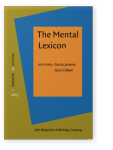Vol. 8:1 (2013) ► pp.26–52
(Ir)regularity of verbs revisited
Evidence for lexical entry complexity
In three experiments we explored the representation and encoding of verb regularity. Contrasting articulation latencies of present and past regular and irregular forms from paradigms consisting of regular, irregular, or hybrid verbs (regular in present, but irregular in past tense), allowed us to differentiate between affixation and stem selection processes. The analyses revealed that regular verbs in the present and past tense were produced significantly faster than all other forms. Crucially, the naming latencies of hybrid and irregular verbs did not differ from each other in both tenses. We conclude that regularity is not a property of individual verb forms, but generalizes to all forms within a paradigm. In a third, picture word interference experiment, we tested whether regularity, when not bound to individual verb forms, is represented in the form of abstract regularity nodes, as assumed for gender or conjugational class. However, the critical conditions did not exhibit the expected congruency effect. Consequently we conclude that the paradigmatic effects could be explained as a result of the complexity of lexical entries. The retrieval of a complex entry (irregular and hybrid verbs) takes longer than the retrieval of a single stem entry (regular verbs).
Cited by (2)
Cited by 2 other publications
This list is based on CrossRef data as of 8 july 2024. Please note that it may not be complete. Sources presented here have been supplied by the respective publishers. Any errors therein should be reported to them.
